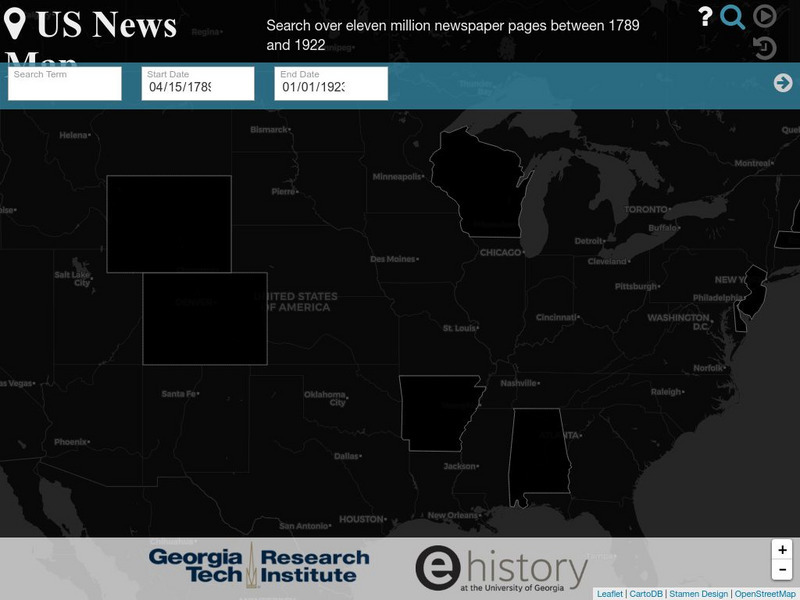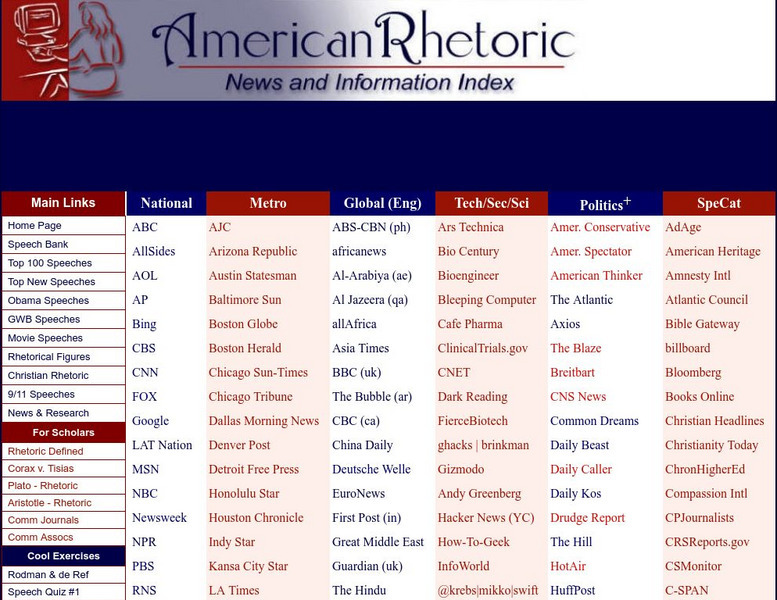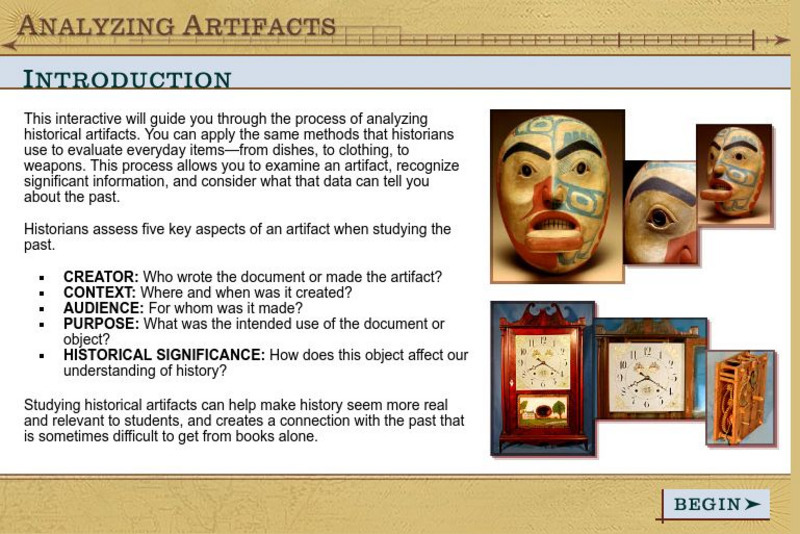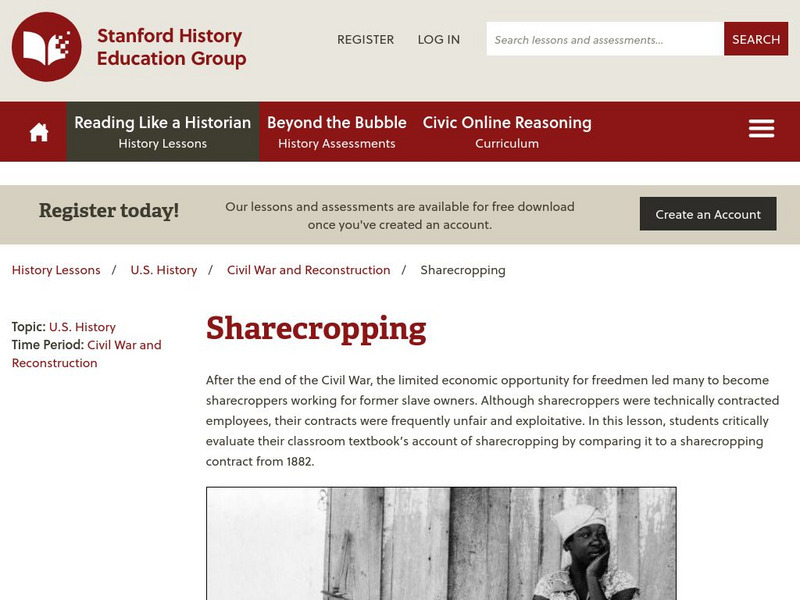Roy Rosenzweig Center for History and New Media
Teaching History: National History Education Clearinghouse
A vast resource filled with information on teaching history at all grade levels. There are links to podcasts, teaching materials, primary source documents, videos, and best practices in the teaching of history. Don't miss this fantastic...
Smithsonian Institution
Smithsonian Education: Artifact & Analysis: Historical Interpretation
A companion to American history courses, Artifact & Analysis features historical artifacts and documents about consumerism and the nation expanding, teacher's guide, writing assignments, and essays.
University of Calgary
Ithaca College: Project Look Sharp: Media Construction of War
Provides a multi-unit curriculum kit relating to the study of war that incorporates media literacy. All material is free to download and includes teacher guides, student handouts, historical documents, slideshows, and more.
Wisconsin Historical Society
Wisconsin Historical Society: A Handbook for Using Historical Documents [Pdf]
Teachers will find this a superb guide book for teaching students how to critically examine documents from the past. The guide contains lessons and resources for Wisconsin history but the teaching methodology can be adapted for anywhere.
Other
Archives Pei: Heritage Fair Projects a Guide to Sources [Pdf]
A comprehensive resource for students and teachers for planning and researching a project for a heritage fair. While it is intended for Prince Edward Island residents, it offers excellent tips, web links and books for guidance.
Other
Georgia Tech Research Institute: Chronicling America: Us News Map
A fascinating way to look at history, this interactive map lets you search for a person, event, issue, etc. over a specified time frame and it maps newspapers containing related content onto a map of the United States. An additional...
Other
George W. Bush Library: What Do Historical Objects Tell Me? [Pdf]
A comprehensive lesson training learners to analyze historical objects to determine features, reliability, authenticity, and provenance through observation skills encouraged through a variety of activities.
American Rhetoric
American Rhetoric: News and Information Index
This website is a news and information index that offers links to news sources, newspapers, magazines and journals, search engines, polling data, legal resources, and citation guides.
Other
Houston Independent School District: Social Studies Strategies [Pdf]
Hone in on methods for historical thinking and the process of historical inquiry when studying social studies.
Annenberg Foundation
Annenberg Learner: Opb American History Interactive: Evaluating Evidence
Use this interactive lesson to practice evaluating evidence from primary sources in order to draw conclusions about a historical event. In this particular case, the event is the Civil War. The challenge is to decide for yourself which of...
Annenberg Foundation
Annenberg Learner: Analyzing Artifacts
Learn the steps in the 5-step process that historians use when they analyze an artifact as you investigate what you can learn from Native American and other items.
Other
Monash University Library: Evaluating Web Pages
Use this guide to learn how to evaluate web pages. This concise guide also addresses why evaluation is important. CCSS.ELA-Literacy.CCRA.R.7
Smithsonian Institution
National Postal Museum: A Student's Guide to Historical Research
This resource focuses on teaching students how to do historical research via a series of steps. Historical photos and documents are included as examples.
Sophia Learning
Sophia: Research Sources: Websites
This slideshow lesson focuses on the use of websites for research sources. It gives the pros and cons to using websites as sources and discusses the need to evaluate websites and what to look for.
Other
Bowdoin: Reading, Writing, Researching for History: A Guide for College Students
Reference guide material discusses how to research, write and read for history.
Stanford University
Beyond the Bubble: History Assessments
[Free Registration/Login Required] A collection of innovative assessments, interactive rubrics, and annotated samples of student work with an emphasis on primary source documents for the use in a wide range of history concepts.
Stanford University
Sheg: Document Based History: Reading Like a Historian: Evaluating Sources
[Free Registration/Login Required] Are all historical sources equally trustworthy? How might the reliability of a historical document be affected by the circumstances under which it was created? For this activity, students sharpen their...
Stanford University
Sheg: Document Based History: Reading Like a Historian: Historical Thinking
[Free Registration/Login Required] This chart elaborates on the historical reading skills of sourcing, corroboration, contextualization, and close reading. In addition to questions that relate to each skill, the chart includes...
Stanford University
Sheg: Reading Like a Historian: Intro to Historical Thinking: Lunchroom Fight
[Free Registration/Login Required] A fight breaks out in the lunchroom and the principal needs to figure out who started it. But when she asks witnesses what they saw, she hears conflicting accounts. Why might these accounts differ? As...
Stanford University
Sheg: Document Based History: Reading Like a Historian: Mapping the New World
[Free Registration/Login Required] Students read primary source documents to solve a problem surrounding a historical question. This document-based inquiry lesson allows students study two 17th-century maps of Virginia and think...
Stanford University
Sheg: Document Based History: Reading Like a Historian: Sharecropping
[Free Registration/Login Required] Learners solve a problem surrounding a historical question by reading primary source documents. This historical inquiry instructional activity allows students to critically evaluate their classroom...
Stanford University
Sheg: Document Based History: Reading Like a Historian: Snapshot Autobiography
[Free Registration/Login Required] What is history? And why do historical accounts differ? In this lesson, students create brief autobiographies and then reflect on the process to better understand how history is written. Exploring these...
Stanford University
Sheg: Document Based History: Reading Like a Historian: Stamp Act
[Free Registration/Login Required] Students solve a problem surrounding a historical question by reading primary source documents. This historical inquiry lesson allows students to engage in key aspects of historical thinking as they...
Stanford University
Sheg: Document Based History: Reading Like a Historian:sourcing Classroom Poster
[Free Registration/Login Required] Sourcing asks students to consider who wrote a document as well as the circumstances of its creation. Who authored a given document? When? For what purpose? This poster reminds students before reading a...




















